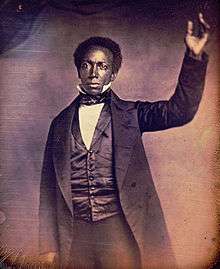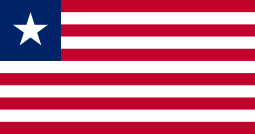Edward James Roye
| Edward James Roye | |
|---|---|
 | |
| 5th President of Liberia | |
|
In office January 3, 1870 – October 26, 1871 | |
| Vice President | James Skivring Smith |
| Preceded by | James Spriggs Payne |
| Succeeded by | James Skivring Smith |
| 4th Chief Justice of Liberia | |
|
In office 1865–1868 | |
| Nominated by | Daniel Bashiel Warner |
| Preceded by | Boston Jenkins Drayton |
| Succeeded by | C. L. Parsons |
| Personal details | |
| Born |
February 3, 1815 Newark, Ohio, United States |
| Died | February 11, 1872 (aged 57) |
| Political party | True Whig |
Edward James Roye (February 3, 1815 – February 11, 1872) served as the fifth President of Liberia from 1870 to his overthrow in 1871 and subsequent violent death. He had previously served as the 4th Chief Justice of Liberia from 1865 until 1868. He was the first member of Liberia's True Whig Party to serve as President.
Early life
Born in 1815 in Newark, Ohio, Roye was a descendant of the Igbo people of present-day Nigeria.[1][2]
Emigration to Liberia
In 1846, attracted by the American Colonization Society's promotion of the relocation of African Americans to the colony of Liberia in West Africa, Roye at the age of 31 emigrated to the colony with his family. There he set up business as a merchant. The next year, the colony gained independence. Within three years of his arrival, Roye became active in Liberian politics, serving as a representative and Speaker of the Liberian House of Representatives, and as Chief Justice of the Supreme Court of Liberia.
Presidency (1870-71)
Roye was inaugurated as President of Liberia on January 3, 1870. In the decades after 1868, escalating economic difficulties weakened the state's dominance over the coastal indigenous tribal peoples. Conditions worsened, the cost of imports was far greater than the income generated by exports of its commodity crops of coffee, rice, palm oil, sugarcane, and timber. Liberia tried desperately to modernize its largely agricultural economy.
Financial problems
In 1871, Roye tasked the Speaker of the House of Representatives, William Spencer Anderson, with negotiating a new loan from British financiers. Anderson secured $500,000 under strict terms from the British consul-general, David Chinery, but was heavily criticised, and was eventually arrested. Anderson was apparently tried the following year for his part in securing the loan. He was found not guilty, but was shot to death while leaving the courthouse.[3]
End of presidency
Roye was removed from the presidency on 26 October 1871. The circumstances surrounding his ouster remain imprecise, although historians believe that he was deposed in a coup d'état. It is not known who carried out the coup d'état. He was jailed for a few months afterward. His unpopular loans with Britain may have given his enemies the reasons to depose him.[4]
Death
No specific historical record is available about the date and circumstances of Roye's death. Varying accounts indicate that he was killed on February 11 or February 12, 1872. Another account suggests that he drowned on February 12, 1872 while trying to reach a British ship in Monrovia harbor.
The portrait of President Roye in the gallery of the Presidential Mansion in Monrovia notes his date of death as February 11, 1872.[5]
See also
References
- ↑ Lynch, Deidre Shauna; Hollis R. Lynch (1970). Edward Wilmot Blyden. Oxford University Press US. p. 3. ISBN 0-19-501268-2.
- ↑ "E.J. Roye, President of Liberia 1870-71". Retrieved 2009-01-16.
- ↑ Shavit, David (1989). The United States in Africa – A Historical Dictionary. Westport, Connecticut: Greenwood press. p. 11. ISBN 0-313-25887-2.
- ↑ David, John Seh (2014-06-17). THE AMERICAN COLONIZATION SOCIETY. iUniverse. p. 186. ISBN 9781491734230.
- ↑ "E.J. Roye", Liberia Past and Present
Further reading
External links
- Brief biographical sketch of Edward James Roye along with a portrait
- see also History of Liberia, external links
| Political offices | ||
|---|---|---|
| Preceded by James Spriggs Payne |
President of Liberia 1870 – 1871 |
Succeeded by James Skivring Smith |
| Legal offices | ||
| Preceded by Boston Jenkins Drayton |
Chief Justice of Liberia 1865 – 1868 |
Succeeded by C. L. Parsons |

